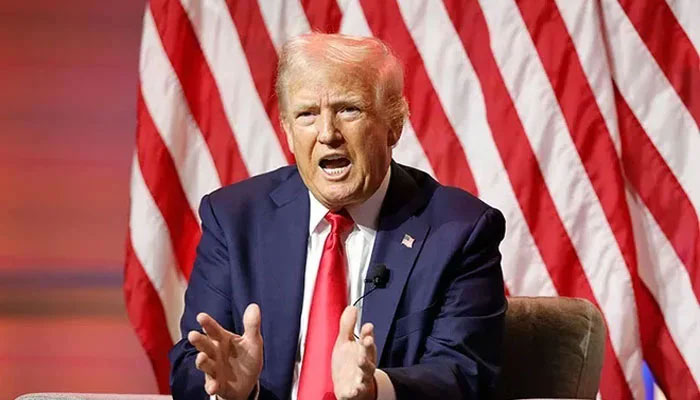Trump’s mediation nod marks turning point in Pakistan’s Kashmir diplomacy
In the labyrinth of international diplomacy, some struggles are easily forgotten while others remain dormant, awaiting a leader bold enough to bring them back to the table. For decades, the people of Indian-occupied Jammu and Kashmir have waited for the world to acknowledge their plight — and more importantly, to act.
Pakistan’s persistent efforts to highlight the Kashmir dispute on global forums, often in the face of India’s aggressive denial and diplomatic resistance, are now finally bearing fruit. A significant development has emerged in the form of a renewed statement by former U.S. President Donald Trump, who has once again reiterated his commitment to resolving the long-standing Kashmir conflict. In a recent press talk, Trump asserted that he had “stopped a war” between Pakistan and India and that he remains willing to act as an arbitrator in the dispute.
This isn’t just diplomatic platitude. It represents a significant shift in tone — one that has surfaced after years of calculated diplomatic manoeuvring by Pakistan and a growing international awareness of India’s refusal to entertain third-party mediation. For Islamabad, which has long maintained that sustainable peace in South Asia hinges on a just settlement of the Kashmir issue, this endorsement from Washington marks a symbolic victory.
Speaking to reporters, Trump emphasized his role in defusing tensions: “Eventually, they were gonna go nuclear… and I stopped it. I called each leader… and I spoke to them and talked about trade,” he said, referring to a moment of heightened hostility between Pakistan and India during his presidency. “They have a large stockpile of nuclear weapons, and I think I should get some credit for bringing them back from the precipice.”
He added that both countries had been receptive to his intervention: “They were both unbelievable. They understood it exactly. They stopped. I stopped that war with phone calls and trade.” Most notably, he reiterated his long-standing offer to mediate the Kashmir dispute: “I told the leadership of India and Pakistan — I can solve anything. I will be your arbitrator.”
Trump’s latest remarks align with statements from his time in office, where he publicly expressed willingness to play a mediating role — a proposal that Pakistan welcomed, and India flatly rejected. Responding to queries about Under Secretary of State for Political Affairs Allison Hooker’s engagement with a Pakistani parliamentary delegation, US State Department spokesperson Tammy Bruce reaffirmed that President Trump remains “ready to assist” in resolving the Kashmir dispute — a sentiment he has voiced repeatedly throughout his political career.
“Trump in each step that he takes, it’s made to solve generational differences between countries,” Bruce emphasized. This development comes at a time when Islamabad’s proactive diplomacy — including a recent visit by a delegation led by Pakistan People’s Party Chairman Bilawal Bhutto Zardari to Washington — has successfully kept Pakistan’s narrative alive in US policymaking circles. Bilawal’s meetings with more than a dozen US lawmakers and senior State Department officials underlined Pakistan’s growing concerns about Indian belligerence, violations of the Indus Waters Treaty, and New Delhi’s incendiary rhetoric.
Pakistan’s willingness to allow a neutral third party such as the United States to mediate in the conflict is both pragmatic and consistent with its longstanding call for international involvement. India, by contrast, clings stubbornly to the claim that Kashmir is a “bilateral matter” — even as it rebuffs every opportunity for actual bilateral engagement.
New Delhi’s refusal to even acknowledge Trump’s latest mediation remarks — let alone respond constructively — reflects a troubling trend: a superpower-in-the-making that would rather let conflict fester than consider solutions involving external facilitation. Yet Trump’s latest statement has once again placed the Kashmir dispute squarely on the international radar.
President Trump’s offer is not the first time an international leader has attempted to mediate the Kashmir conflict — nor is it the first time India has responded with obstruction. In 1962, British Prime Minister Harold Macmillan quietly offered to mediate, fearing the conflict could escalate during the Sino-Indian war. India rejected the offer outright, citing non-interference.
Later, in 1993, then United Nations Secretary-General Boutros Boutros-Ghali offered to mediate after Pakistan raised the issue at the UN Human Rights Commission. India dismissed the overture, claiming it was an “internal matter.”
In 2006, Norwegian Prime Minister Jens Stoltenberg indicated Oslo’s willingness to act as a neutral facilitator between India and Pakistan. Once again, India shut down the proposal, warning foreign governments against what it termed “interference.”
Fast forward to 2009, when UK Prime Minister Gordon Brown offered quiet diplomatic engagement between Islamabad and New Delhi after the Mumbai attacks, aiming to lower tensions and facilitate dialogue. India stonewalled the effort.
In more recent years, in 2019, just days after India revoked Article 370 — the provision that granted special autonomy to Jammu and Kashmir — President Trump publicly stated that Indian Prime Minister Narendra Modi had asked him to mediate on Kashmir. India promptly denied any such request, causing confusion and embarrassment for the US administration. Meanwhile, Pakistan welcomed the offer, reiterating its openness to dialogue through international facilitation.
That Islamabad has managed to keep Kashmir visible in powerful capitals like Washington — even amidst competing crises from Ukraine to Gaza — is a testament to its persistent diplomatic strategy. Critics may rightly argue that statements alone do not solve entrenched conflicts. But acknowledgment is the first necessary step. By securing a public and repeated endorsement from a former U.S. President with ongoing political clout, Pakistan has cracked open a door India has tried desperately to keep shut.
As the world approaches the United Nations General Assembly session in New York this September, anticipation is building over whether a breakthrough — even a symbolic one — might be possible. Even a staged photo-op involving Indian and Pakistani leaders could mark a watershed moment.
Pakistan’s message is simple but resolute: We are ready to talk, to mediate, to seek peaceful solutions. India’s refusal to reciprocate only underscores its discomfort with transparency and its fear of international adjudication.
For the people of Kashmir — who remain voiceless under a prolonged occupation — the world must not reward silence, denial, or stubbornness. Trump’s renewed commitment may very well be the catalyst that breathes life into a peace process long stalled.
And for that, Pakistan’s persistence deserves recognition — not only in Washington but across the international stage. The path to resolution may be long, but momentum, once sparked, has a force of its own.
-
 Selena Gomez Proves Point With New Makeup-free Selfie On Social Media
Selena Gomez Proves Point With New Makeup-free Selfie On Social Media -
 John Mellencamp Shares Heartbreaking Side Effect Of Teddi's Cancer
John Mellencamp Shares Heartbreaking Side Effect Of Teddi's Cancer -
 Kate Middleton 'overjoyed' Over THIS News About Meghan Markle, Prince Harry
Kate Middleton 'overjoyed' Over THIS News About Meghan Markle, Prince Harry -
 'Harry Potter' Star Brendan Gleeson Reluctantly Addresses JK Rowling's Trans Views
'Harry Potter' Star Brendan Gleeson Reluctantly Addresses JK Rowling's Trans Views -
 Priscilla Presley Reveals The Path Elvis Would Have Taken If He Were Still Alive
Priscilla Presley Reveals The Path Elvis Would Have Taken If He Were Still Alive -
 Kianna Underwood's Death Marks Fourth Nickelodeon-related Loss In Weeks, 9th Since 2018
Kianna Underwood's Death Marks Fourth Nickelodeon-related Loss In Weeks, 9th Since 2018 -
 Hayden Christensen Makes Most Funny 'Star Wars' Confession Yet
Hayden Christensen Makes Most Funny 'Star Wars' Confession Yet -
 Subway Surfers City: Release Date, Exciting New Modes, And All The Big Changes Coming In 2026
Subway Surfers City: Release Date, Exciting New Modes, And All The Big Changes Coming In 2026 -
 Tom Ford's Brutal Behaviour With Ashton Kutcher Finally Exposed
Tom Ford's Brutal Behaviour With Ashton Kutcher Finally Exposed -
 Gaten Matarazzo Heaps Praise For Duffer Brothers
Gaten Matarazzo Heaps Praise For Duffer Brothers -
 Millions Of Bluetooth Earbuds At Risk Due To Google Fast Pair Flaw
Millions Of Bluetooth Earbuds At Risk Due To Google Fast Pair Flaw -
 Sarah Ferguson Believes 'royal Machine' Failed To Protect Her
Sarah Ferguson Believes 'royal Machine' Failed To Protect Her -
 'The Night Manager' Producer Proud To Guard Season Two Secret
'The Night Manager' Producer Proud To Guard Season Two Secret -
 Google Files Appeal To Block Data-sharing Orders In Search Monopoly Case
Google Files Appeal To Block Data-sharing Orders In Search Monopoly Case -
 King Charles' Family Missing From Memorial Service Of Princess Irene
King Charles' Family Missing From Memorial Service Of Princess Irene -
 Ryan Guzman Teases Romance For '911' Character Eddie
Ryan Guzman Teases Romance For '911' Character Eddie




